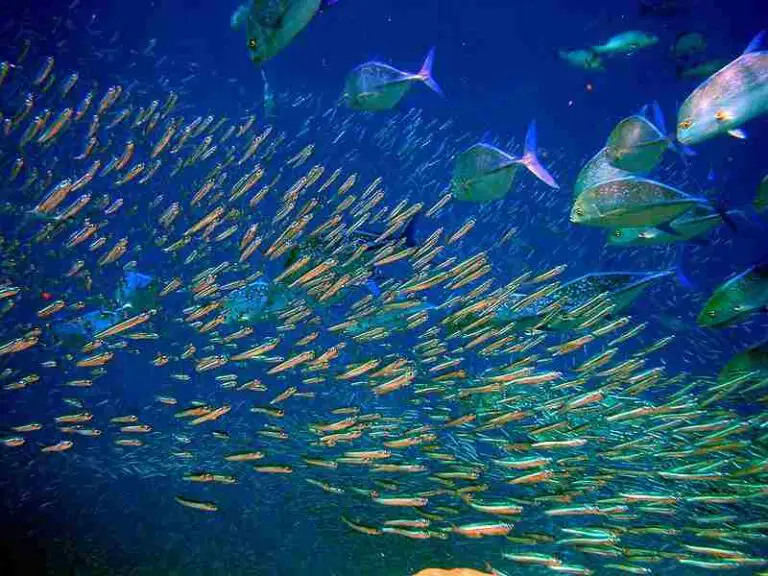5 Causes of Ocean Pollution Explained
Causes of ocean pollution are; offshore exploration and mining, industrial waste discharge, unsustainable agriculture, municipal waste mismanagement, and environmental hazard.
This article discusses the causes of ocean pollution, as follows;
1). Offshore Exploration and Mining (as one of the Causes of Offshore Pollution)
Although deep sea mining is a viable means of slowing-down the rate of terrestrial resource depletion, it could also have instantaneous, negative environmental impacts.
Ocean mining can cause ocean pollution by altering the physicochemical and biological conditions that are required for sustainability in the marine ecosystem.
Equipment and processes used for deep sea exploration may introduce noise, light, chemicals, and tremors into the ocean, all of which can offset the natural equilibrium and affect marine life negatively [3].
Ocean pollution due to mining and exploration may occur under all conditions of resource exploitation; including dredging, deep sea-mineral extraction, and offshore oil and gas exploration.
Especially when best industry practices are not observed, degradation can result from poor handling of equipment, and mismanagement of waste including mine tailings and hydrocarbons.
Oil spill and mining-induced acidification are among the potential outcomes of ocean pollution, that can have severe effects on the quality of water and the availability of oxygen among other nutrients, in the ocean.

2). Industrial Waste Discharge
Industrialization is responsible for regular dumping of millions of tons of waste into the world’s oceans [2].
Examples of industrial wastes that are released into oceans include; byproducts of manufacturing processes, unused raw materials, hot water from turbine systems for electricity generation, agricultural and food production/processing/preservation waste, as well as radioactive waste from nuclear power plants.
Industrial waste affects the ocean by changing the chemical makeup of water and sediments in marine ecosystems; which could have effects like oxygen depletion, and could harm marine life significantly, thereby reducing biodiversity.
These effects reduce the potency and performance of oceans as natural carbon sinks, thereby diminishing their role in geochemical cycles and biochemical processes like carbon sequestration and climate stabilization.
3). Unsustainable Agriculture (as one of the Causes of Offshore Pollution)
A major fraction of ocean pollutants come from land.
Among these, agricultural materials also account for a significant amount. These materials include inorganic waste, agricultural biomass, and chemicals used in farming.
All types of agriculture can contribute to ocean pollution, including aquaculture, livestock and crop farming [1].
These types of agriculture can affect oceans negatively if conducted in an unsustainable manner.
Nutrients from chemical fertilizer for example, can be washed into oceans and cause degradation, through excessive nutrient-accumulation.
Accumulated nutrients can lead to eutrophication and other events which encourage the rapid growth of algae, alteration of physicochemical equilibrium, and depletion of resources like oxygen.
Other agriculture-related practices including waste-to-energy and biofuel production, can contribute to ocean pollution in the form of acidification, among other effects.
4). Municipal Waste Mismanagement
Municipal wastes are dumped into oceans regularly, and are a prominent cause of ocean littering.
Examples of materials comprising such waste include sewage sludge, inorganic waste, food waste, and commercial waste.
These materials can enter into the ocean as a result of poor management practices and indiscriminate dumping.
The major waste causing marine pollution is plastic, a large fraction of which can be traced to municipal sources.
Plastic pollution in oceans can be controlled through sustainable waste management practices like recycling.
Regulations preventing dumping of waste in water bodies can also address this cause of ocean pollution.

5). Environmental Hazard (as one of the Causes of Offshore Pollution)
Both anthropogenic and natural disasters can either facilitate or directly cause ocean pollution.
This is the case for various types of natural disasters including hydrological and meteorological disasters.
Natural disaster can affect marine life by causing rapid changes in oceanic conditions like turbidity, salinity, temperature and pH; which can make it difficult for native species to thrive.
Other manmade environmental hazards like severe, large-scale industrial pollution can also impact oceans.
Examples of natural hazards that cause ocean pollution are; tsunamis, hurricanes, flooding, landslides, and severe erosion.
Conclusion
Causes of ocean pollution are;
1. Offshore Exploration and Mining
2. Industrial Waste Discharge
3. Unsustainable Agriculture
4. Municipal Waste Mismanagement
5. Environmental Hazard
References
1). Diaz, R. J. (2010). “Agriculture’s impact on aquaculture: Hypoxia and eutrophication in marine waters.” Advancing the Aquaculture Agenda (pp.275-318). Available at: https://doi.org/10.1787/9789264088726-20-en. (Accessed 27 November 2022).
2). Ncube, L.; Ude, A. U.; Ogunmuyinwa, E. N.; Zulkifli, R.; Beas, I. N. (2021). “An Overview of Plastic Waste Generation and Management in Food Packaging Industries.” Recycling 6(1):12. Available at: https://doi.org/10.3390/recycling6010012. (Accessed 27 November 2022).
3). Peng, C.; Zhao, X.; Liu, G. (2015). “Noise in the Sea and Its Impacts on Marine Organisms.” International Journal of Environmental Research and Public Health 12(10):12304-12323. Available at: https://doi.org/10.3390/ijerph121012304. (Accessed 27 November 2022).




